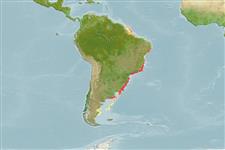Teleostei (teleosts) >
Pleuronectiformes (Flatfishes) >
Achiridae (American soles)
Etymology: Catathyridium: Greek, kata = down + Greek, diminutive, thyreos, -ou = a great stone used as door or shield (Ref. 45335).
More on author: Jordan.
Issue
Jordan (1889: 314), the author of this species, did not give a description, he just indicated that there was a new species and gave the number of the single type specimen (MCZ 11246). See Ramos (1998) for a description and synonymy.
Environment: milieu / climate zone / depth range / distribution range
Ecology
Marine; freshwater; brackish; demersal; amphidromous (Ref. 36798). Subtropical
Southwest Atlantic: estuarine and marine coastal areas of southeastern Brazil, including salt and freshwater portions of Laguna dos Patos basin, Uruguay, and northern Argentina.
Size / Weight / Age
Maturity: Lm ? range ? - ? cm
Max length : 17.0 cm male/unsexed; (Ref. 36798)
Mainly found near river mouths and brackish lagoons (Ref. 36453). May enter fresh water (Ref. 36798).
Life cycle and mating behavior
Maturities | Reproduction | Spawnings | Egg(s) | Fecundities | Larvae
Ramos, R.T.C., 2003. Achiridae (American soles). p. 666-669. In R.E. Reis, S.O. Kullander and C.J. Ferraris, Jr. (eds.) Checklist of the Freshwater Fishes of South and Central America. Porto Alegre: EDIPUCRS, Brasil. (Ref. 36798)
IUCN Red List Status (Ref. 130435)
Threat to humans
Harmless
Human uses
Tools
Special reports
Download XML
Internet sources
Estimates based on models
Preferred temperature (Ref.
123201): 13.5 - 23.9, mean 16.3 °C (based on 113 cells).
Phylogenetic diversity index (Ref.
82804): PD
50 = 0.5625 [Uniqueness, from 0.5 = low to 2.0 = high].
Bayesian length-weight: a=0.01288 (0.00580 - 0.02864), b=3.12 (2.93 - 3.31), in cm total length, based on LWR estimates for this (Sub)family-body shape (Ref.
93245).
Trophic level (Ref.
69278): 3.3 ±0.5 se; based on size and trophs of closest relatives
Resilience (Ref.
120179): High, minimum population doubling time less than 15 months (Preliminary K or Fecundity.).
Fishing Vulnerability (Ref.
59153): Low vulnerability (10 of 100).
